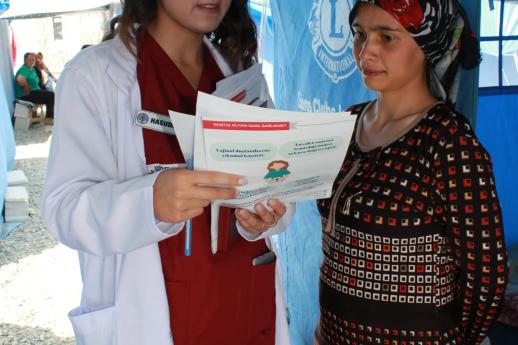Women in internally-displaced persons (IDP) camps in parts of earthquake-affected Türkiye are being physically and sexually abused by their husbands and other family members, raising additional worries about the long-term psychological consequences of February's devastating earthquake that displaced millions.
IPPF’s local partner in one of the camps, the Association of Public Health Specialists (HASUDER), has reported cases of rape and violence against women, with many families facing the stress of unemployment and dire living conditions, including serious hygiene problems in the camps.
HASUDER initiated the Women and Reproductive Health Service Unit with support from IPPF and the Hatay Metropolitan Municipality. Hatay Province was the most affected province by the earthquake, with most of the hospitals and almost all primary health care centers either destroyed or severely damaged.
According to one woman, Ceren*: “My husband is very oppressive, he wants me to be like a slave. He says, ‘Do not do this, do not go there, who are you dressing up for in a tent?’ Not only himself but also his family and relatives are very involved.” She was referred to HASUDER after she was raped by her husband, where she received emergency contraception and was provided with legal advice. She is also receiving psychological care.
Professor Bülent Kılıç, head of HASUDER, says that another issue in the camps is the unmet need for contraceptives, which has soared to nearly 50% and has contributed to a rise in unplanned pregnancies among the women they surveyed.
when
country
Türkiye
region
European Network

I didn't know about birth control pills before. Here, I learned how to use them."

Nineteen-year-old Khadijah* has been married for 3 years and has a two-year-old son. She is considering a new pregnancy but wants to wait until her child is a bit older. She applied to HASUDER’s Women and Reproductive Health Service Unit for contraceptive advice.
“I didn't know about birth control pills before. Here, I learned how to use them. My husband was using a condom but I bought it here for the first time. My husband is not against birth control, but he doesn't want me to take the pill because he has prejudices. I told him what I learned here, I told him that it is healthier."
Professor Kılıç explains that there is a service gap in contraceptive care for earthquake survivors. "We have seen that contraceptive services are only provided in gynaecology clinics in hospitals, and even then it is offered very little and only if requested,” he said. “This issue is related to the government's perspective on women and women's rights.”
The unmet need for contraception has already been on the rise in Türkiye: it was 6% in 2013 and doubled to 12% in 2018, according to UNFPA. Turkish government services are mandated to deliver contraceptive supplies to health clinics inside IDP camps, but Kılıç says services have generally focused on pregnancy and birth services. HASUDER is the only provider of contraceptives in the camps, and also provides maternal and neonatal care, safe abortion care, and counselling for sexual and gender-based violence.
Even before the earthquakes, violence against women and girls was already a serious issue in Türkiye, with 40% of women having suffered physical and/or sexual violence during their lives. With schools closed, soaring unemployment and multi-generational families forced to live together in cramped tents, the care burden on women has also increased. Many women lack any rest or privacy, and when asked about what they miss most, some women answered, “Sitting alone in my house.”
Pregnancy care and follow-ups are another huge problem in Hatay, as the primary health care service had almost completely disappeared after the earthquake. There is almost no hospital where a woman can give birth, and there are an expected 20,000 births per month in the entire earthquake region.

Nurses offer contraceptive counselling in the camps
IPPFProfessor Kılıç, points out that family planning services and sexual health services are priority services.
“We established the reproductive health unit to provide a service for women that is very lacking,” he said. “When it comes to reproductive rights, it covers issues such as not being forced into marriage, women being able to choose the spouse and sexual life they prefer, not being forced into marriage, having children according to their own will, and having children in the number and time they want. This is what family planning means to us. This is how women can make informed decisions about their own reproductive lives.”
IPPF estimates that 3.9 million women of reproductive age, over 175,000 pregnant women, and more than 1.2 million adolescent girls (aged 10-19) were affected by the earthquakes in Türkiye. We anticipate more than 8,700 currently pregnant women will experience delivery complications.
Prof. Kılıç added that he wants to see the current project extended, and to have other institutions, including the Ministry of Health, take on similar initiatives.
“We provide these services as a non-governmental organization, but it is important that they should be provided by the Ministry of Health in a way that is free and accessible to every woman. It needs to be sustainable,” he said.
*Names changed










